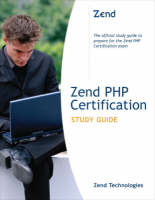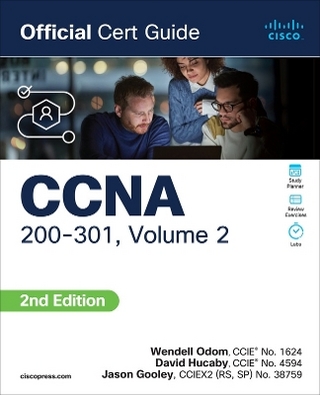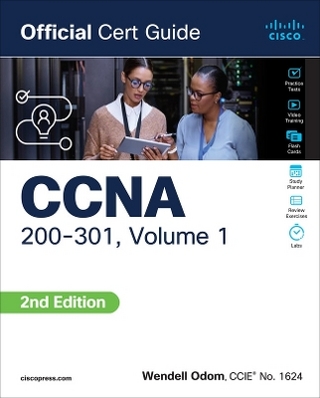
Zend PHP Certification Study Guide
Sams Publishing (Verlag)
978-0-672-32709-4 (ISBN)
- Titel ist leider vergriffen;
keine Neuauflage - Artikel merken
The first and only officially authorized book on the PHP Certification exam developed by Zend Technologies, the commercial developer of PHP. Zend's PHP Certification exam is a high-quality, carefully developed exam designed to enhance and certify the skills of the PHP professional. The Zend PHP Certification Study Guide is a concise, densely packed book that will get you up to speed quickly on the nature of the exam's questions and what to expect on exam day. It's authoritative content comes directly from those writing the exam at Zend Technologies.
Stuart Herbert has designed and implemented solutions for major companies such as Eurostar, Vodafone and HP, and he has been the lead maintainer of the Generic NQS project since 1994. A former systems manager with Orange UK, Stuart is currently one of the developers for Gentoo Linux, where he looks after Gentoo's installer for web-based packages. Daniel Kushner is the director of training and certification at Zend Technologies. As director of training and certification, Daniel is responsible for the Zend PHP Certification program. In addition to designing the certification program, he developed the Zend PHP Training program, which provides the necessary study guide and classes to help PHP developers become Zend PHP certified. George Schlossnagle is a principal at OmniTI Computer Consulting, a Maryland-based tech company specializing in high-volume web and email systems. Before joining OmniTI, George lead technical operations at several high-profile community websites, where he developed experience managing PHP in very large enterprise environments. George is a frequent contributor to the PHP community. Chris Shiflett is a frequent contributor to the PHP community and one of the leading security experts in the field. His solutions to security problems are often used as points of reference, and these solutions are showcased in his talks at conferences such as ApacheCon and the O'Reilly Open Source Convention and his articles in publications such as PHP Magazine and php|architect. Björn Schotte is a German PHP veteran. He co-founded the first German-speaking portal for PHP topics in early 1999, co-organized the first worldwide PHP conference, and has been editor-in-chief of PHP Magazin since 2001. He also co-founded ThinkPHP, Germany's No. 1 PHP solution company dealing mainly with large PHP applications for clients such as HypoVereinsbank, Sixt, Lycos Europe, E.ON, Cap Gemini, Ernst & Young, and others. His company now consists of a team of more than 15 people, including PHP core developers. Marco Tabini is the publisher of php|architect, the premier magazine for PHP professionals, and has worked on websites for clients ranging from small startup operations to the Fortune 500s. Despite having been an IT industry professional for the last fifteen years, he still manages to maintain a reasonable level of sanity—at least most of the time. Marco is also a subject matter expert for the Zend PHP Certification Exam.
Introduction.
What Does This Guide Cover?
How Is the Guide Organized?
Other Resources You Might Want to Consult.
1. The Basics of PHP.
Terms You’ll Need to Understand.
Techniques You’ll Need to Master.
Language and Platform.
Getting Started.
The Special Tags.
Scripts and Files.
Manipulating Data.
Numeric Values.
String Values.
Boolean Values.
Arrays.
Objects.
The NULL Data Type.
Resources.
Identifiers, Constants, and Variables.
Variables.
Variable Substitution in Strings.
Statements.
Constants.
Operators.
The Assignment Operator.
Arithmetic Operators.
Bitwise Operators.
Error-control Operators.
String Operators.
Comparison Operators.
Logical Operators.
Typecasting.
Combined Assignment Operators.
Combining Operations: Operator Precedence and Associativity.
Conditional Structures.
Alternative if-then-else Syntax.
Short-form if-then-else .
The case Statement.
Iteration and Loops.
The while Structure.
The do-while Structure.
The for Loop.
Continuing a Loop.
Functions and Constructs.
Functions and Variable Scope.
Functions with Variable Parameters.
Variable Variables and Variable Functions.
Exam Prep Questions.
2. Object-Oriented PHP.
Terms You’ll Need to Understand.
Techniques You’ll Need to Master.
Getting Started.
Instantiating a Class: Objects.
Classes as Namespaces.
Objects and References.
Implementing Inheritance.
Magic Functions: Serializing Objects.
Exam Prep Questions.
3. PHP and the Web.
Terms You’ll Need to Understand.
Techniques You’ll Need to Master.
Server-side Versus Client-side.
HTML Forms.
Cookies.
Sessions.
Exam Prep Questions.
4. Arrays.
Terms You’ll Need to Understand.
Techniques You’ll Need to Master.
Creating Arrays.
Using the Array Operator.
Counting the Number of Elements in an Array.
Assigning Values from an Array to Multiple Variables.
Multidimensional Arrays.
Navigating Arrays.
Using foreach .
Using the Internal Pointer.
Using a Callback.
Manipulating Keys.
Checking if an Element Exists.
Changing the Array of Keys.
Sorting an Array by Its Keys.
Manipulating Arrays.
Sorting Multidimensional Arrays.
Randomizing Arrays.
Merging Arrays.
Intersection and Difference.
Serializing Arrays.
Exam Prep Questions.
5. Strings and Regular Expressions.
Terms You’ll Need to Understand.
Techniques You’ll Need to Master.
Comparing Strings.
Comparison with == and === .
Using strcmp and Friends.
Matching Portions of Strings.
Formatting Strings.
printf Formats.
printf() Family Functions.
Extracting Data from Strings.
Extracting Substrings by Offset.
Extracting Formatted Data.
Modifying Strings.
Modifying Substrings by Offset.
Replacing Substrings.
Regular Expressions.
Basic PCRE Syntax.
Extracting Data with Regular Expressions.
Pattern Replacement with Regular Expressions.
Splitting Strings into Components.
Exam Prep Questions.
6. File Manipulation.
Techniques You’ll Need to Master.
Terms You’ll Need to Understand.
Opening Files.
Closing Files.
Reading from a File.
Writing to a File.
Determining Information About Files.
Manipulating Files on the Filesystem.
Copying, Deleting, and Moving Files.
Changing Ownership and Permissions.
Locking Files.
Miscellaneous Shortcuts.
file() .
readfile() .
file_get_contents() .
Exam Prep Questions.
7. Managing Dates and Times.
Terms You’ll Need to Understand.
Techniques You’ll Need to Master.
How PHP Handles Dates.
Getting the Current Time Stamp.
Getting a Date Array.
Formatting a Date String.
Getting a UNIX Time Stamp from a Date Array.
Getting A UNIX Time Stamp from a String.
Exam Prep Questions.
8. Managing Email.
Introduction.
Terms You’ll Need to Understand.
Techniques You’ll Need to Master.
How Email Is Delivered.
MTA–Mail Transport Agent.
SMTP–Simple Mail Transport Protocol.
MX Records.
MUA–Mail User Agent.
SASL–Simple Authentication and Security Layer.
Other Emerging Technologies.
Preparing PHP.
If You Are Using PHP on UNIX.
If You Are Using PHP on Windows or Netware.
Sending Email.
Sending an Email to More Than One Recipient.
Managing Email Headers.
The Cc: and Bcc: Headers.
The From: Header.
Setting the Subject.
Formatting an Email Message.
Plain-Text Emails.
Basic HTML Emails.
Attaching a File to a Message.
Attached Images for HTML Emails.
Using Extra Command-Line Parameters.
A Word About Email Delivery.
Further Reading.
Exam Prep Questions.
9. PHP and Databases.
Terms You’ll Need to Understand.
Techniques You’ll Need to Master.
“Databasics”.
Indices.
Writing Good Indices.
Primary Keys.
Foreign Keys and Relations.
Creating Tables or Adding and Removing Rows.
Inserting a Row.
Deleting Rows.
Retrieving Information from a Database.
Extracting Data from More Than One Table.
Aggregate Functions.
Sorting.
Transactions.
PHP and Databases.
There’s Date and Date.
Exam Prep Questions.
10. Stream and Network Programming.
Terms You’ll Need to Understand.
Techniques You’ll Need to Master.
php.ini Settings to Understand.
What Are File Wrappers?
How Do You Choose Which File Wrapper Is Used?
What Built-In Wrappers Does PHP Provide?
Not All Wrappers Are Created Equal.
Using a File Wrapper.
Correctly Detecting Line Endings.
Closing a File Wrapper.
Other Functions That Work with File Wrappers.
Introducing Streams.
What Is Stream Metadata?
Pipelines.
What Is the Stream Transport?
What Is the Stream Context?
How Do Streams Affect Me?
Connecting to Remote Hosts Using Sockets.
When Should I Use a Socket Instead of a File Wrapper?
What Network Transports Does PHP Support?
How Do I Open a Socket?
Persistent Sockets.
Timeouts When Opening a Socket.
How Do I Use a Socket?
Blocking Mode.
Read/Write Timeouts.
Closing a Socket.
Further Reading.
Exam Prep Questions.
11. Security.
Terms You’ll Need to Understand.
Techniques You’ll Need to Master.
Data Filtering.
Register Globals.
SQL Injection.
Command Injection.
Cross-Site Scripting.
Shared Hosting.
Exam Prep Questions.
12. Debugging and Performance.
Terms You’ll Need to Understand.
Techniques You’ll Need to Master.
Coding Standards.
Flattening if Statements.
Splitting Single Commands Across Multiple Lines.
Concatenation Versus Substitution.
Choose Your Opening Tags Carefully.
One Equal, Two Equals, Three Equals.
There’s Equal and Equal.
Testing for Resource Allocation.
Ternary Operators and if Statements.
Logging and Debugging.
Using Debuggers.
Optimizing Performance.
Hardware Issues.
Web Server Issues.
Avoid Overkill.
Zip It Up.
Database Optimizations.
Keep Your Code Simple.
Caching Techniques.
Bytecode Caches.
Exam Prep Questions.
13. Getting Ready for the Certification Exam.
What the Exam Tests.
How to Register.
Registration via Pearson VUE Call Center.
Registration via the Person VUE Website.
Registration at the Test Center.
What to Expect at the Test Center.
How the Exam Works.
Exam Instructions.
NDA (NONDISCLOSURE AGREEMENT).
Viewing Backward and Forward.
Reviewing Your Answers.
Your Comments.
What Kinds of Questions Are Asked?
Single Choice Questions.
Multiple Choice Questions.
Fill in the Blanks Questions.
Open Questions.
Practice Exam Questions.
Glossary.
Index.
| Erscheint lt. Verlag | 19.8.2004 |
|---|---|
| Verlagsort | Indianapolis |
| Sprache | englisch |
| Maße | 178 x 229 mm |
| Gewicht | 424 g |
| Themenwelt | Mathematik / Informatik ► Informatik ► Web / Internet |
| Informatik ► Weitere Themen ► Zertifizierung | |
| ISBN-10 | 0-672-32709-0 / 0672327090 |
| ISBN-13 | 978-0-672-32709-4 / 9780672327094 |
| Zustand | Neuware |
| Haben Sie eine Frage zum Produkt? |
aus dem Bereich


